Key takeaways:
- Cleaning frequency significantly affects both physical health and mental well-being, promoting a serene atmosphere that enhances focus and reduces anxiety.
- Factors like living space size, presence of pets, and personal lifestyle dictate how often one should clean, emphasizing the need for flexibility in routines.
- Effective cleaning can be achieved through specific strategies, such as setting timers for tasks, using the right tools, and maintaining a “one in, one out” philosophy to manage clutter.
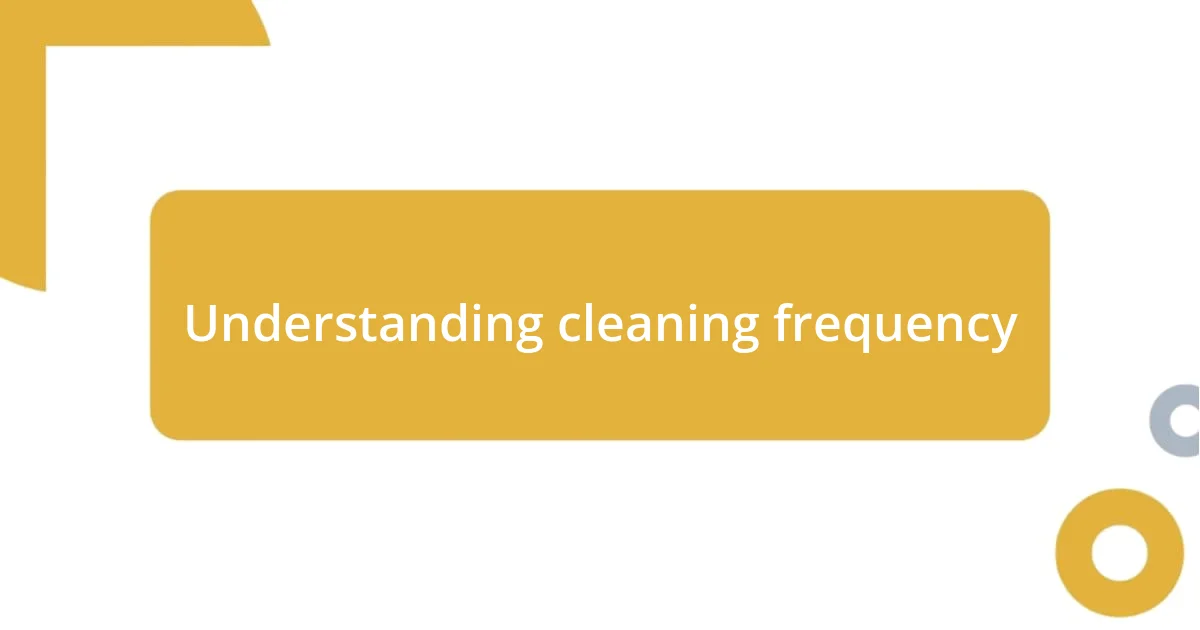
Understanding cleaning frequency
Cleaning frequency isn’t just about personal preference; it deeply impacts our physical and mental well-being. I remember moving into my first apartment and discovering dust bunnies lurking in every corner. It struck me then how much environment can affect mood; a clean space genuinely seemed to lighten my spirits.
Have you ever noticed how a cluttered area can feel overwhelming? I certainly have. When I didn’t clean regularly, anxiety crept in, making it harder to focus on tasks. Frequent cleaning not only clears the physical space but also declutters the mind, creating a more serene atmosphere for productivity.
The question of how often to clean often arises in conversations. Personally, I’ve found that sticking to a consistent routine helps me avoid the dreaded “cleaning binge.” Balancing practicality with my energy levels has been a game changer; I now view cleaning less as a chore and more as a way to foster tranquility in my home. What does your cleaning routine look like?
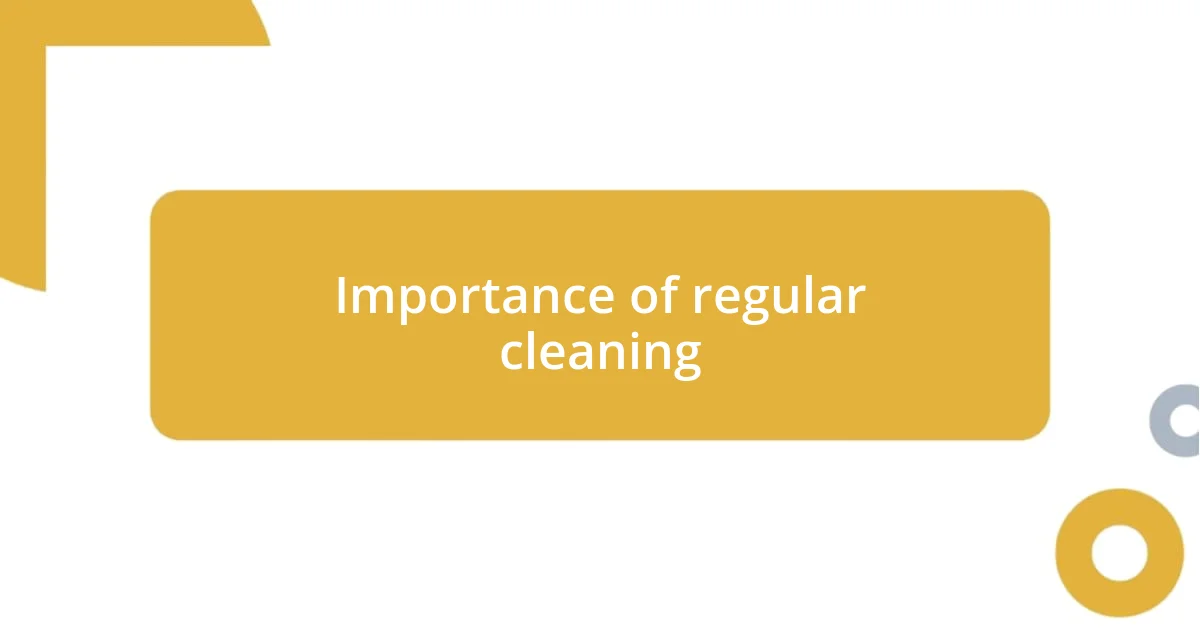
Importance of regular cleaning
Regular cleaning plays a crucial role in maintaining both a healthy living space and a clear mind. I recall a time when I skipped my weekly cleaning routine, and it didn’t take long for the clutter to pile up. The resulting chaos not only made my home feel uninviting, but it also led to increased anxiety. I’ve learned that a tidy environment promotes peace and mindfulness, enabling me to think more clearly and feel more grounded.
Consider the following benefits of regular cleaning:
- Healthier Environment: Reducing dust, allergens, and germs can prevent illness.
- Enhanced Focus: A clean space minimizes distractions, allowing greater concentration on tasks.
- Emotional Well-being: A neat and organized home promotes a sense of calm and control.
- Increased Productivity: Less clutter means more energy to tackle your to-do list.
These experiences and insights have shown me that maintaining cleanliness is vital for both physical health and mental clarity, proving time and again that regular cleaning is more than just a chore; it’s a pathway to a better quality of life.
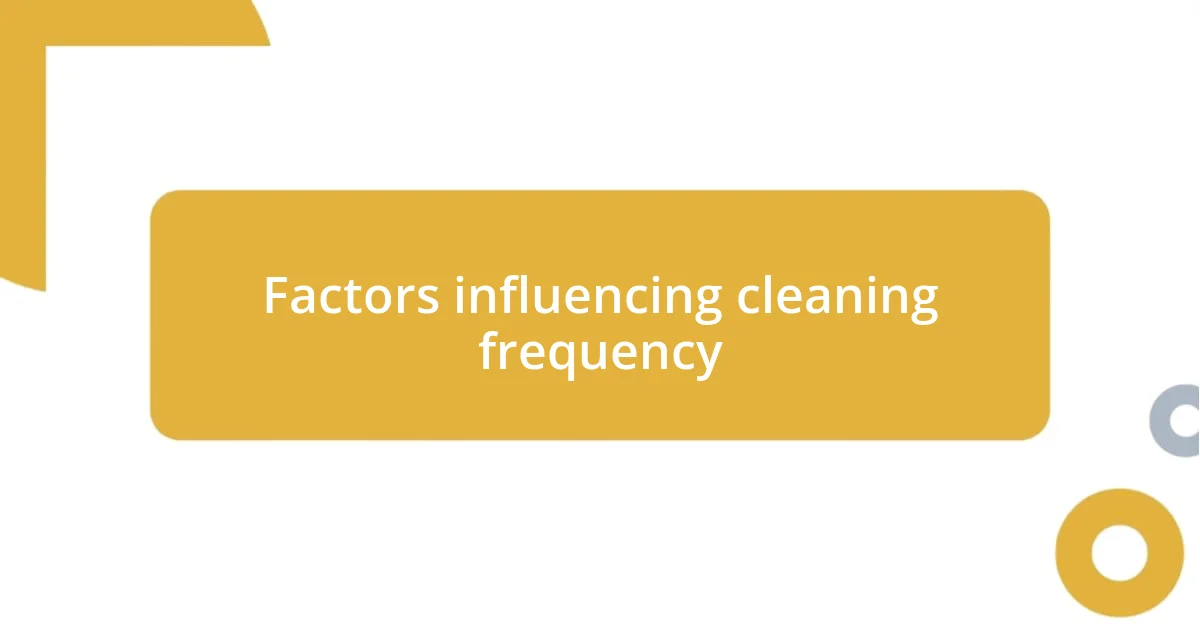
Factors influencing cleaning frequency
Cleaning frequency is influenced by several factors that can vary from person to person. For instance, I’ve noticed that the size of the living space directly impacts how often I feel the need to clean. In a large apartment, dirt and clutter can hide away for a while, but in a smaller space, the disorder becomes apparent much quicker. This awareness drives me to keep up with my cleaning schedule to maintain a pleasant atmosphere.
Another significant factor is the presence of pets. As someone who has a lively dog, I can tell you that shedding fur and muddy paw prints can create a never-ending cleaning cycle! I find myself vacuuming more often and investing time in regularly washing pet items. Without these tasks, I’d quickly feel overwhelmed by the fur and mess. It’s a tangible reminder that while pets bring joy, they also require extra effort to keep our homes clean.
Lastly, lifestyle and routines greatly shape cleaning frequency. When I had more free time, I embraced a thorough weekly cleaning ritual, but now with a busier schedule, I’ve had to adapt. I focus on smaller, consistent tasks throughout the week instead of one big cleaning day. This shift has taught me that flexibility is key; after all, life is unpredictable, and adapting your cleaning approach can maintain both hygiene and sanity.
| Factor | Impact on Cleaning Frequency |
|---|---|
| Size of Living Space | Affects how quickly mess becomes noticeable |
| Presence of Pets | Increases need for frequent cleaning due to fur and stains |
| Lifestyle and Routines | Determines the balance between thorough and quick cleaning tasks |
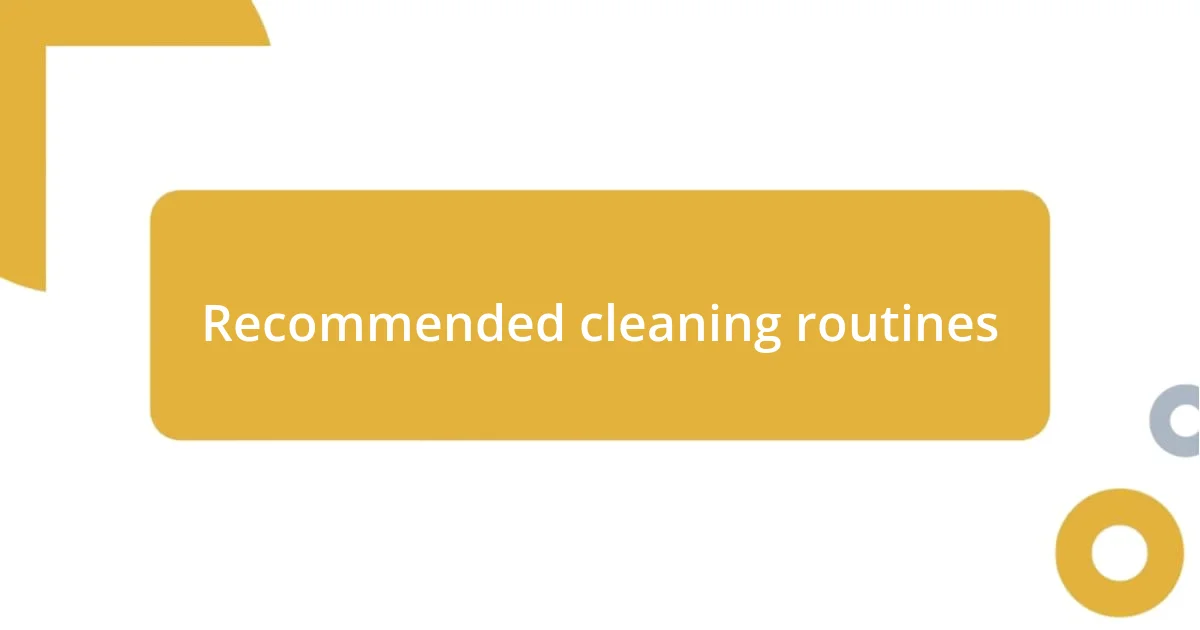
Recommended cleaning routines
I’ve discovered that establishing a solid cleaning routine can make a world of difference in managing household tasks. To keep things manageable, I usually dedicate a specific task to each day of the week. For instance, Mondays are for dusting surfaces, Wednesdays are for tackling the bathroom, and on Fridays, I focus on the kitchen. Breaking it down this way not only spreads out the workload but also keeps my home consistently fresh, allowing me to enjoy a clean space without feeling overwhelmed.
When it comes to the weekends, I treat them as my catch-up days. I sometimes find myself spending a couple of hours on Saturday doing deeper cleans like mopping floors or organizing the garage. But I try to balance that with leisure activities too. After all, who wants to spend all their free time cleaning? This approach ensures I feel both accomplished and relaxed, making the most of my downtime.
Have you ever noticed how certain areas of your home need attention more than others? Personally, I make it a point to declutter my living room every few days. Between mail, books, and just everyday life, it can quickly become a jumble. Keeping an eye on these hotspots prevents clutter from taking over, creating a much more inviting space. I think this awareness is key to maintaining a comfortable home environment.

Adapting frequency to your lifestyle
Adjusting your cleaning frequency to fit your lifestyle is essential for keeping a calm and inviting home. I remember when I juggled a full-time job and evening classes. At that time, I couldn’t afford lengthy cleaning sessions every week. I found that doing a quick ten-minute tidy-up in the mornings made a significant difference. It felt manageable and helped me maintain a sense of order without diving into a massive weekend cleaning spree.
What I’ve also discovered is that my mood can impact how often I want to clean. There are days when I feel energized and ready to tackle everything, but on others, even a couple of dishes in the sink can feel like a mountain. Embracing this ebb and flow has taught me to listen to my own energy levels, allowing me to adjust my cleaning expectations accordingly. Have you ever noticed how a slight change in your routine can make an enormous difference in your motivation? It’s empowering to realize that staying clean doesn’t need to be one-size-fits-all.
Another aspect to consider is how social events can shift your cleaning frequency. I love hosting dinner parties, which means a last-minute cleaning scramble the day before. But I’ve learned to adapt by doing minor clean-ups throughout the week, so the big event isn’t so daunting. This approach makes me feel prepared and less stressed, allowing me to focus more on enjoying the company rather than worrying about the mess. It’s all about finding that sweet spot that works for you and makes comfortable living a delightful experience.
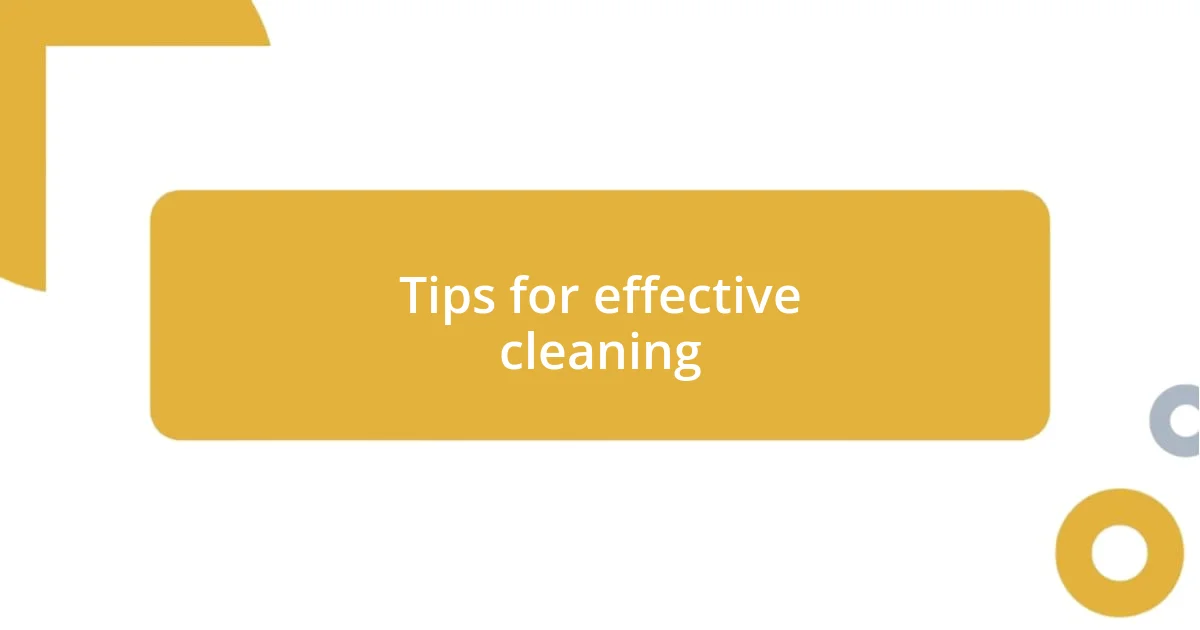
Tips for effective cleaning
When it comes to effective cleaning, I’ve found that setting a timer can completely change the game. I’ve started challenging myself with a 15-minute cleaning sprint, and it’s amazing what I can accomplish in that short burst. Whether it’s tidying up the kitchen counter or clearing clutter from my desk, it feels almost like a mini workout, and somehow, I always manage to enjoy it.
One tip that I absolutely swear by is the power of the right tools. Investing in a good vacuum cleaner or microfiber cloths makes the process smoother. I’ve experienced the frustration of ineffective cleaning products, and it felt like I was just moving dirt around rather than getting rid of it. It’s worth taking the time to find what truly works for you, don’t you think?
Lastly, embracing a “one in, one out” philosophy has been game-changing for me. Whenever I buy something new, I make it a point to let go of something old. This has helped me keep clutter at bay and maintain a clearer living space. Have you ever been overwhelmed by too many items? It can be liberating to simplify your surroundings, shifting the focus to what truly matters, rather than what needs constant cleaning.
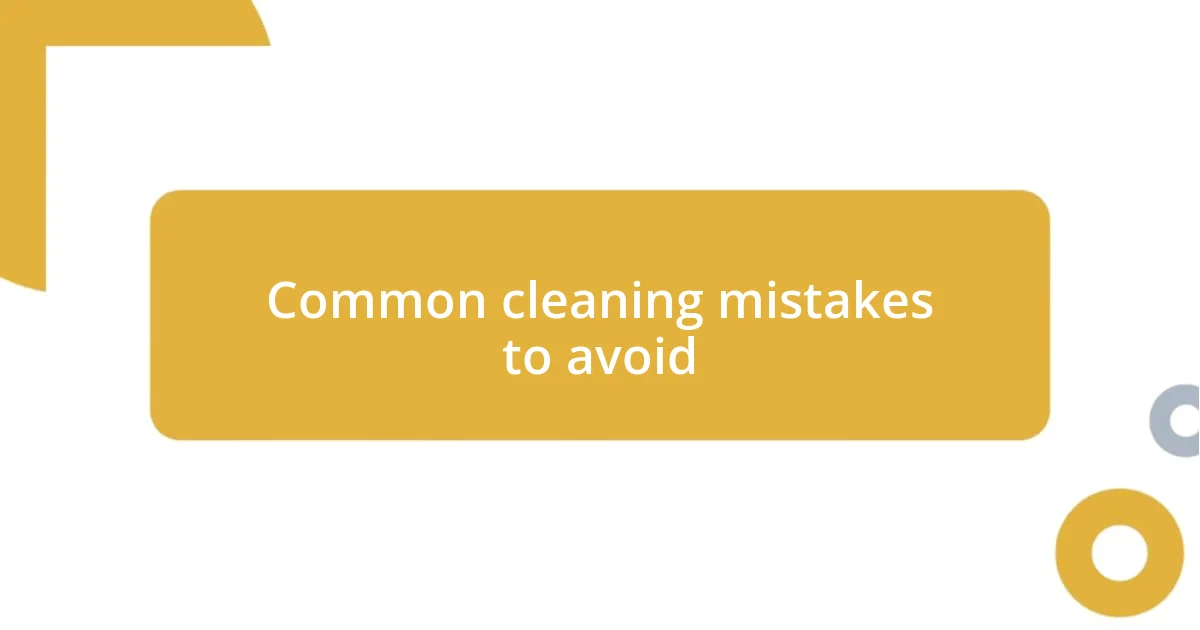
Common cleaning mistakes to avoid
One common mistake I see, and have made myself, is neglecting the details during a cleaning session. You might think that vacuuming the floors is enough, but what about those neglected corners or the dust that gathers atop baseboards? I once had a friend over who commented on how dusty my blinds were, and it was a bit embarrassing. It’s these small areas that often go unnoticed but can really affect the overall cleanliness and ambiance of your home.
Another significant oversight is relying too heavily on the same cleaning routine. I learned the hard way that what works for one area, like my kitchen counters, doesn’t necessarily applies to my bathroom. After a few attempts that left soap scum behind, I realized I needed specific products for specific challenges. Have you encountered a cleaning task that simply didn’t go as planned because of the wrong approach? I certainly have, and it made me rethink how I tackle each space.
Finally, I find that many of us mistakenly think we need to tackle it all in one go. This “all or nothing” mindset can be quite overwhelming. I used to set aside an entire Saturday to clean, but then I’d be drained by lunchtime! I’ve switched to breaking it down into smaller, manageable tasks throughout the week. What about you? Isn’t it much more gratifying to feel a sense of accomplishment in shorter bursts rather than waiting all day for that final reveal? Embracing this approach makes cleaning feel less like a chore and more like a series of small victories.















